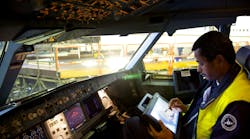SEATTLE, June 16, 2014 /PRNewswire/ -- Boeing [NYSE:BA] today announced Southwest Airlines has selected Boeing Airplane Health Management (AHM) to enhance operational efficiency in its maintenance and engineering operations.
Southwest Airlines will use Airplane Health Management to collect and evaluate airplane operations data while the airplane is in flight. This real-time data is used to signal ground operations crews of any potential maintenance issues before the airplane lands, minimizing flight schedule disruptions and maintenance-related delays.
"In our trials with Airplane Health Management, we clearly saw how we would be able to reduce – and even avoid – unscheduled maintenance and ground time for our fleet," said Jim Sokol, vice president of Maintenance Operations, Southwest Airlines. "The predictive nature of this product allows us to proactively initiate planning for necessary repairs, even while an airplane is in flight. With this capability, we can mitigate schedule delays and help ensure on time arrivals and departures for our customers."
Boeing technical teams will work with Southwest to facilitate initial deployment of the system for its Next-Generation 737s. Southwest is Boeing's 66th customer for Airplane Health Management.
"We expect to see an immediate cost benefit with the introduction of Airplane Health Management to our next-generation 737 fleet," said Trevor Stedke, vice president of Technical Services, Southwest Airlines. "We're excited to work with Boeing to take advantage of the full potential of this product and further leverage its capabilities to improve efficiency across our operations."
Boeing Airplane Health Management is a powerful, data-driven capability used worldwide by airplane operators and maintenance, repair and overhaul providers (MROs) to proactively manage the serviceability of airplanes and fleets. It is designed to interface with existing airplane systems and communication infrastructure, using state-of-the-art airplane and ground technology to address day-of-operation disruptions, help predict future operations events and prevent unplanned maintenance and schedule interruptions.
Airplane Health Management is part of an integrated suite of aviation services marketed as the Boeing Edge. These include parts, training, engineering, maintenance and software solutions that increase the efficiency and profitability of airlines and leasing companies.
"Throughout the long relationship between Boeing and Southwest, we have worked closely together to support ongoing focused efforts in applying state-of-the-art technology to solve day-of-operations issues," said Rick Anderson, vice president, Sales, Commercial Aviation Services. "We are very pleased to provide Digital Aviation solutions such as Boeing Airplane Health Management to enhance and accelerate improvements in Southwest's operations with real-time data analysis, which gives our customers a competitive advantage."
Southwest Airlines is an all-Boeing carrier and operates the largest 737 fleet of any airline. In 2011, the airline became the launch customer for the 737 MAX.



